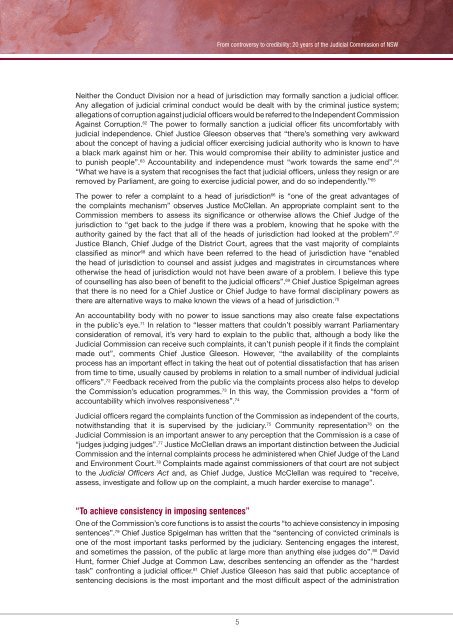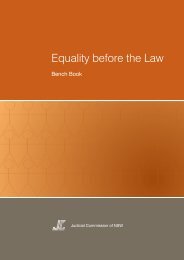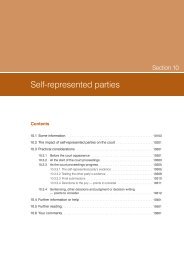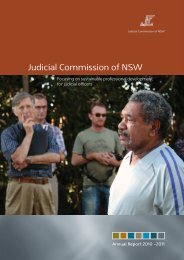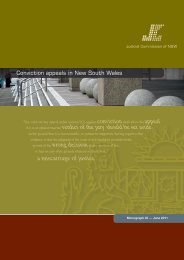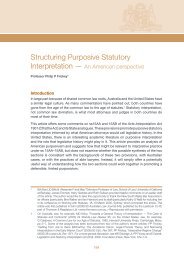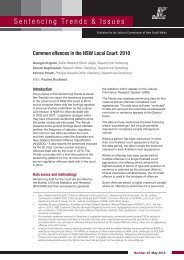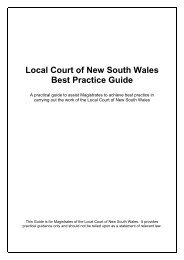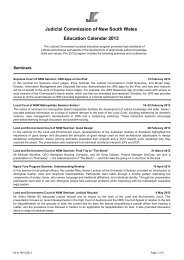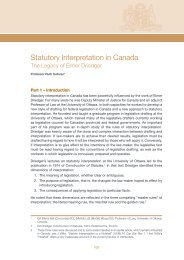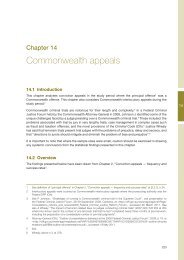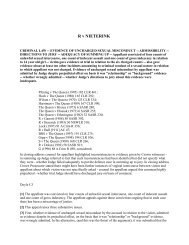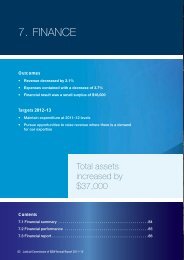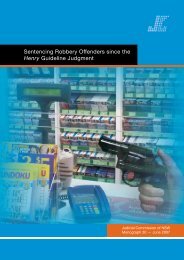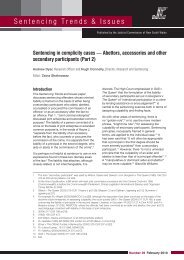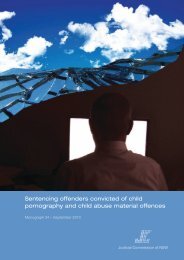From controversy to credibility: 20 years of the Judicial Commission ...
From controversy to credibility: 20 years of the Judicial Commission ...
From controversy to credibility: 20 years of the Judicial Commission ...
You also want an ePaper? Increase the reach of your titles
YUMPU automatically turns print PDFs into web optimized ePapers that Google loves.
<strong>From</strong> <strong>controversy</strong> <strong>to</strong> <strong>credibility</strong>: <strong>20</strong> <strong>years</strong> <strong>of</strong> <strong>the</strong> <strong>Judicial</strong> <strong>Commission</strong> <strong>of</strong> NSW<br />
Nei<strong>the</strong>r <strong>the</strong> Conduct Division nor a head <strong>of</strong> jurisdiction may formally sanction a judicial <strong>of</strong>ficer.<br />
Any allegation <strong>of</strong> judicial criminal conduct would be dealt with by <strong>the</strong> criminal justice system;<br />
allegations <strong>of</strong> corruption against judicial <strong>of</strong>ficers would be referred <strong>to</strong> <strong>the</strong> Independent <strong>Commission</strong><br />
Against Corruption. 62 The power <strong>to</strong> formally sanction a judicial <strong>of</strong>ficer fits uncomfortably with<br />
judicial independence. Chief Justice Gleeson observes that “<strong>the</strong>re’s something very awkward<br />
about <strong>the</strong> concept <strong>of</strong> having a judicial <strong>of</strong>ficer exercising judicial authority who is known <strong>to</strong> have<br />
a black mark against him or her. This would compromise <strong>the</strong>ir ability <strong>to</strong> administer justice and<br />
<strong>to</strong> punish people”. 63 Accountability and independence must “work <strong>to</strong>wards <strong>the</strong> same end”. 64<br />
“What we have is a system that recognises <strong>the</strong> fact that judicial <strong>of</strong>ficers, unless <strong>the</strong>y resign or are<br />
removed by Parliament, are going <strong>to</strong> exercise judicial power, and do so independently.” 65<br />
The power <strong>to</strong> refer a complaint <strong>to</strong> a head <strong>of</strong> jurisdiction 66 is “one <strong>of</strong> <strong>the</strong> great advantages <strong>of</strong><br />
<strong>the</strong> complaints mechanism” observes Justice McClellan. An appropriate complaint sent <strong>to</strong> <strong>the</strong><br />
<strong>Commission</strong> members <strong>to</strong> assess its significance or o<strong>the</strong>rwise allows <strong>the</strong> Chief Judge <strong>of</strong> <strong>the</strong><br />
jurisdiction <strong>to</strong> “get back <strong>to</strong> <strong>the</strong> judge if <strong>the</strong>re was a problem, knowing that he spoke with <strong>the</strong><br />
authority gained by <strong>the</strong> fact that all <strong>of</strong> <strong>the</strong> heads <strong>of</strong> jurisdiction had looked at <strong>the</strong> problem”. 67<br />
Justice Blanch, Chief Judge <strong>of</strong> <strong>the</strong> District Court, agrees that <strong>the</strong> vast majority <strong>of</strong> complaints<br />
classified as minor 68 and which have been referred <strong>to</strong> <strong>the</strong> head <strong>of</strong> jurisdiction have “enabled<br />
<strong>the</strong> head <strong>of</strong> jurisdiction <strong>to</strong> counsel and assist judges and magistrates in circumstances where<br />
o<strong>the</strong>rwise <strong>the</strong> head <strong>of</strong> jurisdiction would not have been aware <strong>of</strong> a problem. I believe this type<br />
<strong>of</strong> counselling has also been <strong>of</strong> benefit <strong>to</strong> <strong>the</strong> judicial <strong>of</strong>ficers”. 69 Chief Justice Spigelman agrees<br />
that <strong>the</strong>re is no need for a Chief Justice or Chief Judge <strong>to</strong> have formal disciplinary powers as<br />
<strong>the</strong>re are alternative ways <strong>to</strong> make known <strong>the</strong> views <strong>of</strong> a head <strong>of</strong> jurisdiction. 70<br />
An accountability body with no power <strong>to</strong> issue sanctions may also create false expectations<br />
in <strong>the</strong> public’s eye. 71 In relation <strong>to</strong> “lesser matters that couldn’t possibly warrant Parliamentary<br />
consideration <strong>of</strong> removal, it’s very hard <strong>to</strong> explain <strong>to</strong> <strong>the</strong> public that, although a body like <strong>the</strong><br />
<strong>Judicial</strong> <strong>Commission</strong> can receive such complaints, it can’t punish people if it finds <strong>the</strong> complaint<br />
made out”, comments Chief Justice Gleeson. However, “<strong>the</strong> availability <strong>of</strong> <strong>the</strong> complaints<br />
process has an important effect in taking <strong>the</strong> heat out <strong>of</strong> potential dissatisfaction that has arisen<br />
from time <strong>to</strong> time, usually caused by problems in relation <strong>to</strong> a small number <strong>of</strong> individual judicial<br />
<strong>of</strong>ficers”. 72 Feedback received from <strong>the</strong> public via <strong>the</strong> complaints process also helps <strong>to</strong> develop<br />
<strong>the</strong> <strong>Commission</strong>’s education programmes. 73 In this way, <strong>the</strong> <strong>Commission</strong> provides a “form <strong>of</strong><br />
accountability which involves responsiveness”. 74<br />
<strong>Judicial</strong> <strong>of</strong>ficers regard <strong>the</strong> complaints function <strong>of</strong> <strong>the</strong> <strong>Commission</strong> as independent <strong>of</strong> <strong>the</strong> courts,<br />
notwithstanding that it is supervised by <strong>the</strong> judiciary. 75 Community representation 76 on <strong>the</strong><br />
<strong>Judicial</strong> <strong>Commission</strong> is an important answer <strong>to</strong> any perception that <strong>the</strong> <strong>Commission</strong> is a case <strong>of</strong><br />
“judges judging judges”. 77 Justice McClellan draws an important distinction between <strong>the</strong> <strong>Judicial</strong><br />
<strong>Commission</strong> and <strong>the</strong> internal complaints process he administered when Chief Judge <strong>of</strong> <strong>the</strong> Land<br />
and Environment Court. 78 Complaints made against commissioners <strong>of</strong> that court are not subject<br />
<strong>to</strong> <strong>the</strong> <strong>Judicial</strong> Officers Act and, as Chief Judge, Justice McClellan was required <strong>to</strong> “receive,<br />
assess, investigate and follow up on <strong>the</strong> complaint, a much harder exercise <strong>to</strong> manage”.<br />
“To achieve consistency in imposing sentences”<br />
One <strong>of</strong> <strong>the</strong> <strong>Commission</strong>’s core functions is <strong>to</strong> assist <strong>the</strong> courts “<strong>to</strong> achieve consistency in imposing<br />
sentences”. 79 Chief Justice Spigelman has written that <strong>the</strong> “sentencing <strong>of</strong> convicted criminals is<br />
one <strong>of</strong> <strong>the</strong> most important tasks performed by <strong>the</strong> judiciary. Sentencing engages <strong>the</strong> interest,<br />
and sometimes <strong>the</strong> passion, <strong>of</strong> <strong>the</strong> public at large more than anything else judges do”. 80 David<br />
Hunt, former Chief Judge at Common Law, describes sentencing an <strong>of</strong>fender as <strong>the</strong> “hardest<br />
task” confronting a judicial <strong>of</strong>ficer. 81 Chief Justice Gleeson has said that public acceptance <strong>of</strong><br />
sentencing decisions is <strong>the</strong> most important and <strong>the</strong> most difficult aspect <strong>of</strong> <strong>the</strong> administration<br />
5


